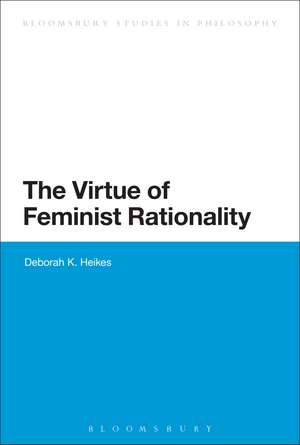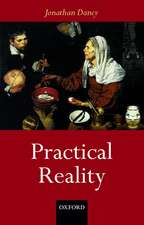The Virtue of Feminist Rationality: Bloomsbury Studies in Philosophy
Autor Professor Deborah K. Heikesen Limba Engleză Paperback – 20 noi 2013
| Toate formatele și edițiile | Preț | Express |
|---|---|---|
| Paperback (1) | 256.49 lei 43-57 zile | |
| Bloomsbury Publishing – 20 noi 2013 | 256.49 lei 43-57 zile | |
| Hardback (1) | 890.72 lei 43-57 zile | |
| Bloomsbury Publishing – 18 apr 2012 | 890.72 lei 43-57 zile |
Din seria Bloomsbury Studies in Philosophy
- 13%
 Preț: 257.50 lei
Preț: 257.50 lei - 13%
 Preț: 256.77 lei
Preț: 256.77 lei - 22%
 Preț: 256.20 lei
Preț: 256.20 lei - 22%
 Preț: 257.03 lei
Preț: 257.03 lei - 13%
 Preț: 255.47 lei
Preț: 255.47 lei - 22%
 Preț: 237.28 lei
Preț: 237.28 lei - 22%
 Preț: 257.50 lei
Preț: 257.50 lei - 22%
 Preț: 773.81 lei
Preț: 773.81 lei - 13%
 Preț: 256.20 lei
Preț: 256.20 lei - 22%
 Preț: 258.89 lei
Preț: 258.89 lei - 13%
 Preț: 255.11 lei
Preț: 255.11 lei -
 Preț: 256.20 lei
Preț: 256.20 lei - 22%
 Preț: 772.58 lei
Preț: 772.58 lei - 22%
 Preț: 240.50 lei
Preț: 240.50 lei - 22%
 Preț: 257.03 lei
Preț: 257.03 lei - 23%
 Preț: 255.84 lei
Preț: 255.84 lei - 23%
 Preț: 255.29 lei
Preț: 255.29 lei - 13%
 Preț: 237.28 lei
Preț: 237.28 lei - 13%
 Preț: 235.00 lei
Preț: 235.00 lei -
 Preț: 258.42 lei
Preț: 258.42 lei - 14%
 Preț: 773.06 lei
Preț: 773.06 lei - 30%
 Preț: 774.03 lei
Preț: 774.03 lei - 30%
 Preț: 774.20 lei
Preț: 774.20 lei - 30%
 Preț: 774.86 lei
Preț: 774.86 lei
Preț: 256.49 lei
Nou
Puncte Express: 385
Preț estimativ în valută:
49.09€ • 53.35$ • 41.27£
49.09€ • 53.35$ • 41.27£
Carte tipărită la comandă
Livrare economică 21 aprilie-05 mai
Preluare comenzi: 021 569.72.76
Specificații
ISBN-13: 9781472533456
ISBN-10: 1472533453
Pagini: 224
Dimensiuni: 156 x 234 x 12 mm
Greutate: 0.31 kg
Editura: Bloomsbury Publishing
Colecția Bloomsbury Academic
Seria Bloomsbury Studies in Philosophy
Locul publicării:London, United Kingdom
ISBN-10: 1472533453
Pagini: 224
Dimensiuni: 156 x 234 x 12 mm
Greutate: 0.31 kg
Editura: Bloomsbury Publishing
Colecția Bloomsbury Academic
Seria Bloomsbury Studies in Philosophy
Locul publicării:London, United Kingdom
Caracteristici
Offers a means to ground feminist claims to objectivity, truth, justice, equality, fairness
Notă biografică
Deborah K. Heikes is Associate Professor of Philosophy at the University of Alabama at Huntsville, USA. She is the author of Rationality and Feminist Philosophy (Continuum, 2010).
Cuprins
Acknowledgments\ 1. Why Reason? \ 2. The Fossil of Reason\ 3. The Virtue of Reason \ 4. The Virtue of Embodiment \ 5. The Virtue of Emotion \ 6. The Virtue of Difference \ 7. The Virtue of Subjectivity \ 8. The Future of Reason \ Notes \ References \ Index
Recenzii
'This is a rich and rewarding book which provides aninnovative feminist account of reason as a substantive and normative notion.Its argument proceeds within the framework of virtue theory and exploits productivelysome of the dichotomies surrounding the concepts of reason and rationality. Itis a must read for anybody interested in feminism or rationality.'
The Virtue of Feminist Rationality is an essay on the virtue of reason that takes seriously feminist and post-colonial critiques of Enlightenment rationality,while preserving those elements that are essential to human wisdom in the broadest sense of the term. The book eruditely weaves together historical and contemporary sources on reason and rationality, covering canonical themes and oppositional criticisms, to construct a virtue theory of rationality that denies the dichotomies that historically placed women in subordinate positions.Yet, Heikes insists that rationality is too precious to be abandoned as sexist or reactionary, particularly for feminists and humanists. Her account of reason is of an embodied practice, integrally connected to emotional as well as perceptual experience, that at its most virtuous seeks to be objective, judicious, and pragmatic, yet does not deny its fallibilism. The result is a rich account of reason that can serve our human philosophical quest for wisdom.
The Virtue of Feminist Rationality is an essay on the virtue of reason that takes seriously feminist and post-colonial critiques of Enlightenment rationality,while preserving those elements that are essential to human wisdom in the broadest sense of the term. The book eruditely weaves together historical and contemporary sources on reason and rationality, covering canonical themes and oppositional criticisms, to construct a virtue theory of rationality that denies the dichotomies that historically placed women in subordinate positions.Yet, Heikes insists that rationality is too precious to be abandoned as sexist or reactionary, particularly for feminists and humanists. Her account of reason is of an embodied practice, integrally connected to emotional as well as perceptual experience, that at its most virtuous seeks to be objective, judicious, and pragmatic, yet does not deny its fallibilism. The result is a rich account of reason that can serve our human philosophical quest for wisdom.
















